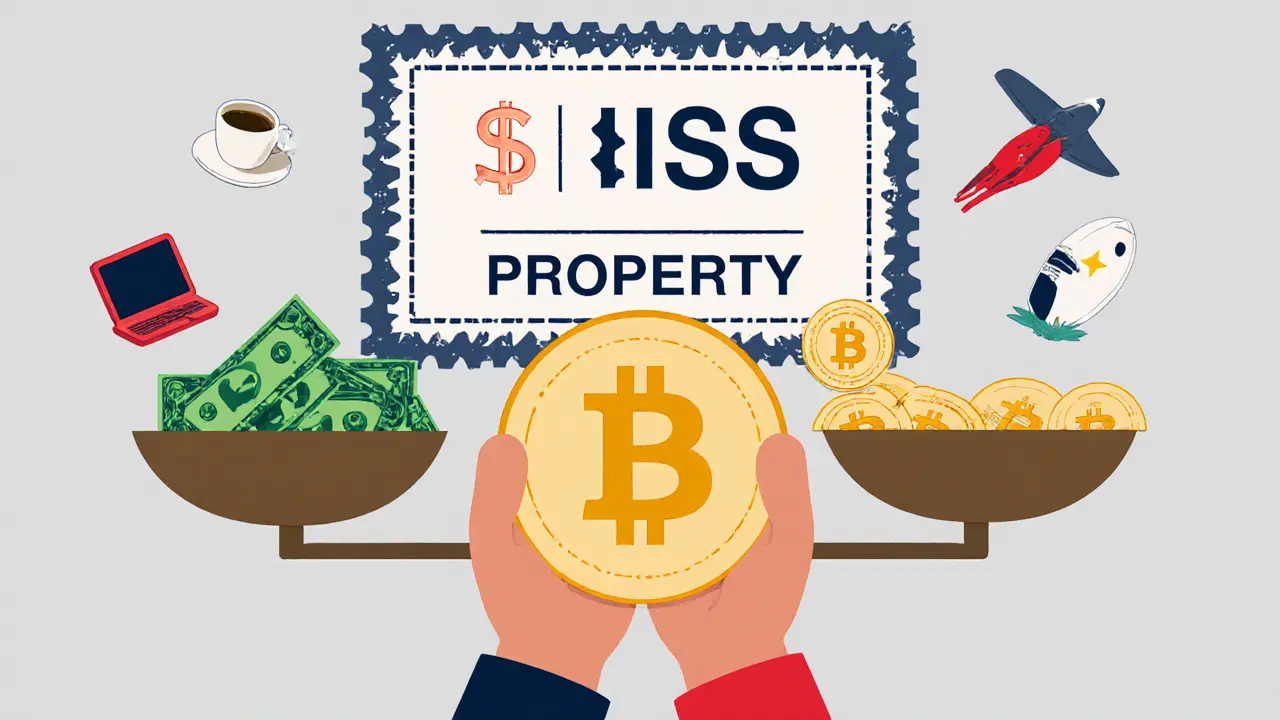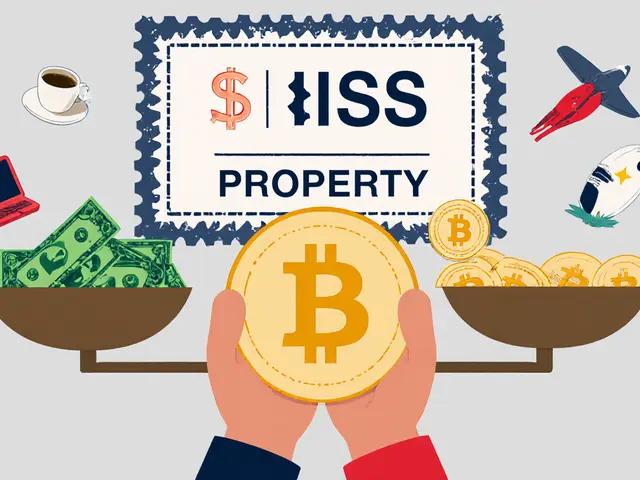Crypto as Property: US Tax Treatment for Bitcoin

Crypto Tax Calculator
Input Your Transactions
Enter Your Bitcoin Purchases
Enter Your Bitcoin Sales
Tax Calculation Results
Based on your transactions and US tax rules
Important: The IRS requires accurate record-keeping for all crypto transactions. This calculator is for informational purposes only and doesn't replace professional tax advice.
Every time you buy a coffee with Bitcoin, sell Ethereum for dollars, or receive crypto as payment, you’re triggering a taxable event in the United States. It doesn’t matter if you’re a casual user or a full-time trader. The IRS treats Bitcoin and other cryptocurrencies as property, not currency. That single classification changes everything about how you report your crypto activity-and how much you might owe in taxes.
Why Bitcoin Isn’t Treated Like Cash
In 2014, the IRS dropped a bombshell in Notice 2014-21: virtual currencies are property. That means Bitcoin behaves like stocks, real estate, or collectibles for tax purposes, not like dollars or euros. If you use Bitcoin to buy groceries, you’re not just spending money-you’re selling an asset. And when you sell an asset, you either make a profit or take a loss. Both are taxable. This rule hasn’t changed in over a decade. Even after the GENIUS Act passed in July 2025 and the CLARITY Bill moved through the House, the IRS held firm. Regulatory bodies like the SEC might classify some tokens as securities, but the IRS doesn’t care. For tax purposes, Bitcoin is property. Period.Three Ways Bitcoin Can Be Classified
Not all Bitcoin is taxed the same. How it’s treated depends on how you use it:- Business property: If you mine Bitcoin as part of your business, the coins you earn are ordinary income. You report their fair market value on the day you receive them, and any future sale triggers capital gains.
- Investment property: Most people fall here. If you buy Bitcoin hoping it will rise in value, it’s an investment. Sell after holding it more than a year? You get long-term capital gains rates-possibly as low as 0%. Sell within a year? You pay your regular income tax rate, up to 37%.
- Personal property: Using Bitcoin to pay for a vacation or a laptop counts as a personal transaction. Even then, you still owe tax on any gain. The IRS doesn’t make exceptions for small purchases.
How to Calculate Your Gain or Loss
Every time you sell, trade, or spend Bitcoin, you need to figure out your cost basis and compare it to what you got in return. Your cost basis is what you paid for the Bitcoin, including fees. Let’s say you bought 1 BTC in January 2023 for $25,000. Later that year, you bought another 0.5 BTC for $18,000. Your total basis is $43,000 for 1.5 BTC. Now you sell 1 BTC for $30,000. How much gain do you report? If you use specific identification, you can pick which unit you sold. You could choose the one bought for $25,000, so your gain is $5,000. But you need records to prove it-transaction IDs, wallet addresses, timestamps. No records? The IRS forces you to use FIFO (first-in, first-out). That means the first BTC you bought is the first one sold. In this case, you’d still report a $5,000 gain. If you’d sold the 0.5 BTC bought for $18,000 instead, you’d have a $12,000 gain. The choice matters. That’s why record-keeping isn’t optional-it’s your legal defense.
Long-Term vs. Short-Term Capital Gains
Holding Bitcoin longer than a year can save you thousands. Here’s what the 2024 tax rates look like:| Filing Status | 0% Rate Up To | 15% Rate Range | 20% Rate Above |
|---|---|---|---|
| Single | $47,025 | $47,026-$518,900 | $518,901 |
| Married Filing Jointly | $94,050 | $94,051-$583,750 | $583,751 |
| Head of Household | $63,000 | $63,001-$551,350 | $551,351 |
Hard Forks, Airdrops, and Free Crypto
You get free Bitcoin from a hard fork? That’s taxable income. A hard fork happens when a blockchain splits-like Bitcoin Cash splitting off from Bitcoin. If you don’t get any new coins, nothing to report. But if you receive new coins via an airdrop, the IRS says: you’ve earned income. The amount? The fair market value of the new coin on the day you could access and control it. Say you received 5 BCH worth $200 on the day the fork occurred. You report $200 as ordinary income. Your cost basis in those 5 BCH is now $200. If you later sell them for $300, you have a $100 capital gain. The IRS doesn’t care if you didn’t ask for it. If it shows up in your wallet and you can move it, it’s income.What Counts as a Taxable Event?
You don’t need to sell Bitcoin to trigger a tax. Here’s the full list:- Selling Bitcoin for USD or any fiat currency
- Trading Bitcoin for another cryptocurrency (e.g., BTC to ETH)
- Using Bitcoin to buy goods or services
- Receiving Bitcoin as payment for work or services
- Mining Bitcoin
- Receiving airdropped tokens

Record-Keeping Is Non-Negotiable
The IRS doesn’t need to prove you made a mistake. You have to prove you didn’t. That means keeping records for every transaction since you first bought Bitcoin. You need:- Date of each purchase and sale
- Amount of Bitcoin bought or sold
- Price in USD at the time
- Wallet addresses involved
- Transaction IDs
- Purpose of the transaction (e.g., “paid for rent,” “traded for ETH”)
What Happens If You Don’t Report?
The IRS added a simple question to Form 1040 in 2020: “At any time during 2024, did you receive, sell, send, exchange, or otherwise acquire any financial interest in any virtual currency?” Answer “no” when you should’ve said “yes”? That’s tax fraud. The IRS has been actively auditing crypto users since 2021. They’ve partnered with blockchain analytics firms like Chainalysis to trace transactions. Even if you used a non-KYC exchange, they can still find you. Penalties can include:- 20% accuracy-related penalty on underpaid tax
- 75% fraud penalty if the IRS proves intent
- Criminal charges for willful evasion
What’s Next?
The property classification isn’t going away. Congress might tweak rules around reporting thresholds or capital gains rates, but the core idea-Bitcoin is property-will stay. The IRS has spent over a decade building enforcement tools around this framework. They’re not going to abandon it now. The real question isn’t whether the rules will change. It’s whether you’re ready to comply. If you’re holding Bitcoin, you’re holding a taxable asset. Every transaction leaves a digital trail. Every gain, every loss, every airdrop-it all matters. The best defense isn’t ignorance. It’s documentation.Is buying Bitcoin with USD a taxable event?
No. Buying Bitcoin with USD is not a taxable event. You’re exchanging one asset (cash) for another (Bitcoin). No gain or loss is recognized at this point. You only trigger taxes when you sell, trade, or spend the Bitcoin later.
Do I owe tax if I lose Bitcoin?
Losing access to Bitcoin (e.g., forgotten password, lost hardware wallet) is not a deductible loss under current IRS rules. You can’t claim a capital loss unless you’ve sold or exchanged the asset. If it’s gone and you can’t prove it was disposed of, you can’t deduct it.
Can I use crypto losses to offset stock gains?
Yes. Crypto capital losses can offset capital gains from stocks, real estate, or any other asset. You can also deduct up to $3,000 in net capital losses against ordinary income each year. Any excess losses carry forward to future years.
Do I need to report crypto received as a gift?
Receiving crypto as a gift is not taxable at the time of receipt. But when you later sell it, you must report the gain or loss based on the original donor’s cost basis and holding period. If the donor’s basis is unknown, you may need to use zero basis, which could result in a higher tax bill.
What if I only trade between cryptocurrencies?
Every trade between cryptocurrencies is a taxable event. Swapping BTC for ETH is treated as selling BTC for USD and then buying ETH with USD. You must calculate the gain or loss on the BTC you sold, even if you never touched fiat currency.
Are NFTs taxed the same way as Bitcoin?
Yes. NFTs are treated as property by the IRS. Buying, selling, or trading NFTs triggers capital gains or losses. If you create and sell an NFT as part of a business, the income is ordinary. If you buy and hold as an investment, it’s subject to capital gains rules.

Benjamin Jackson
Man, I remember when people thought crypto was just a fad. Now it’s like trying to explain why your toaster is taxable if you use it to pay for pizza. The IRS didn’t ask for this responsibility, but here we are.
It’s wild how something so digital feels so physical when taxes are involved. You’re not just trading coins-you’re moving pieces on a board no one told you about.
Liam Workman
Bitcoin as property? 🤔
Kinda makes sense when you think about it-like owning a rare comic book. You don’t pay tax when you buy it, but the second you trade it for something else? Boom. Capital gain.
Still, I wish they’d just call it currency. Less headache. More pizza. 😅
Louise Watson
Buying BTC with USD? Not taxable. Selling it? Taxable. That’s it.
Leo Lanham
Oh great. So now even my crypto gains are taxed like my uncle’s old stamp collection. Why not just make me file a form every time I buy a latte with Dogecoin?
Next they’ll send me a 1099 for my NFT monkey.
THIS IS A JOKE, RIGHT?
Brian Webb
I appreciate how thorough this breakdown is. I used to think I could just ignore crypto taxes until I got a letter from the IRS.
Turns out, they already know. Every transaction. Every swap. Every airdrop you didn’t even ask for.
Best advice? Use software. Don’t trust your memory. Don’t even trust your wallet. Trust the logs.
Whitney Fleras
Just started my first crypto tax season. I was terrified. Now I feel like I’ve got a roadmap.
Thank you for making this feel less like a legal maze and more like a checklist.
One step at a time.
Colin Byrne
Let me be clear: the IRS is not your friend. They are not here to help you. They are here to collect. And they have algorithms that track your wallet addresses better than your ex tracks your Instagram likes.
Claiming you didn’t know? That’s not a defense. It’s a liability.
And don’t even get me started on the fact that you can’t deduct lost keys. That’s not tax policy. That’s cruelty disguised as law.
Cierra Ivery
Wait-so if I buy BTC, then swap it for ETH, then swap ETH for SOL, then SOL for BTC… I owe taxes on EACH swap? Even if I end up with the same amount I started with?
That’s not taxation. That’s extortion. The IRS is literally taxing me for moving money in circles.
And you call this a free market?
Veeramani maran
bro i use binance and trustwallet and i never keep records… how can they find me??
i think they cant… i think its all fake… they dont have power to track my wallet… right??
Kevin Mann
OKAY SO HERE’S THE REAL DEAL:
I LOST MY HARDWARE WALLET. I FORGOT THE PASSPHRASE. I’M OUT $150K.
AND THE IRS SAYS I CAN’T DEDUCT IT?
WHAT KIND OF MONSTROSITY IS THIS??
I’M NOT ASKING FOR A REFUND. I’M ASKING FOR A MIRACLE.
MY THERAPIST ISN’T EVEN HELPING.
WHY DOES THIS HAPPEN TO ME??
Kathy Ruff
People forget: crypto losses can offset stock gains. So if you lost money on Solana but made $20k on Apple stock, you can use that loss to reduce your tax bill.
And if you lost more than you gained? You can deduct up to $3,000 from your regular income every year.
It’s not all bad. There’s a silver lining if you’re organized.
Robin Hilton
Canada? You guys are lucky. You don’t even have to report crypto unless you’re a billionaire. Here in the States? We’re being watched like prisoners in a digital cage.
And the worst part? The IRS doesn’t even know what they’re doing. They’re using 2014 rules on a 2025 economy.
This isn’t regulation. It’s chaos with a Form 8949.
Grace Huegel
It’s not about the tax. It’s about the violation.
You didn’t consent to this. You didn’t ask to be a taxpayer on your own digital life.
And now, every time you send a token, you’re being judged.
It’s not capitalism. It’s surveillance capitalism.
I miss the days when money was just… money.
Nitesh Bandgar
THE IRS IS A DICTATORSHIP!!!
THEY HAVE NO RIGHT TO TRACK MY WALLET!!!
THEY DON’T EVEN KNOW WHAT A BLOCKCHAIN IS!!!
AND NOW THEY WANT ME TO REPORT MY AIRDROPS???
I GOT 5 BCH FOR FREE!!! I DIDN’T EVEN ASK FOR IT!!!
THIS IS COMMUNISM WITH A TAX FORM!!!
Jessica Arnold
Interesting how the U.S. treats crypto as property while the EU is moving toward a unified digital asset framework.
It’s not just about tax-it’s about sovereignty. Who controls the narrative of value?
And if Bitcoin is property, then what is a tokenized bond? A house? A car?
We’re not just redefining money. We’re redefining ownership.
Chloe Walsh
So let me get this straight… I spend 1 BTC on a $50,000 Lamborghini and I owe taxes on the gain… but if I bought the Lamborghini with cash, I wouldn’t owe anything?
What is this, 1984 but with more math?
And why does the IRS care how I spend my money?
It’s not their business. It’s mine.
And I’m done playing their game.
Stephanie Tolson
If you’re holding crypto, you’re holding a piece of the future.
And yes, it’s complicated. Yes, it’s messy. Yes, the IRS is overreaching.
But here’s the thing-you don’t have to be perfect. You just have to be consistent.
Start small. Track one transaction. Then another. Use a free tool. Don’t wait until April to panic.
You’ve got this. And you’re not alone.
Megan Peeples
Of course the IRS wants to tax crypto. They’re terrified of decentralization.
They can’t control it. They can’t print it. They can’t freeze it.
So they tax it. That’s their only power left.
And you know what? They’re losing.
Because people are waking up.
And they’re not going back to the system.
Sarah Scheerlinck
I’m an immigrant. I came here for opportunity. But this? This feels like a trap.
I didn’t understand the rules. I didn’t know I had to track every swap.
Now I’m scared to even touch crypto.
Can someone help me? Not with the math. With the fear?
karan thakur
THE IRS IS A COVERT BANKING SYSTEM.
THEY’RE USING CRYPTO TAXES TO FORCE YOU INTO THE FEDERAL SYSTEM.
EVERY TIME YOU REPORT, YOU’RE GIVING THEM YOUR DIGITAL FINGERPRINT.
THEY WANT TO CONTROL YOUR MONEY. THEY WANT TO KNOW EVERYTHING.
THEY’RE NOT TAXING YOU. THEY’RE RECRUITING YOU.
DO NOT FALL FOR IT.
Evan Koehne
Oh wow. So the IRS is now the world’s most boring blockchain analytics firm.
Next they’ll start offering NFTs as tax refunds.
‘Congratulations! You’ve earned a CryptoPunk… in 2047, when the audit is complete.’
Vipul dhingra
you think you know tax but you dont
you think you can outsmart the system but you cant
the blockchain is public and they have ai that tracks every satoshi
you think you are anonymous but you are not
you are just a number in their database
and when you get audited you will cry
Jacque Hustead
Thank you for writing this so clearly. I’ve been avoiding this for years.
Now I feel like I can finally breathe.
I’m going to start tracking my transactions this week.
One step at a time. No shame in starting late.
Jeana Albert
THIS IS A SCAM. A BIG, FAT, GOVERNMENT SCAM.
YOU THINK YOU OWN BITCOIN? YOU DON’T.
THE IRS OWNS YOU.
THEY’LL TAKE YOUR GAINS, THEN THEY’LL TAKE YOUR PRIVACY.
THEN THEY’LL TAKE YOUR FREEDOM.
AND WHEN YOU ASK WHY, THEY’LL SAY ‘IT’S THE LAW.’
THEY’RE NOT LAWFUL. THEY’RE LYING.
AND YOU’RE HELPING THEM.
Diana Smarandache
It is imperative to underscore that the classification of cryptocurrency as property, as established under Notice 2014-21, remains the prevailing legal framework under Section 1001 of the Internal Revenue Code.
Any deviation from this paradigm, including the proposed GENIUS Act or CLARITY Bill, does not alter the foundational tax treatment under existing statutory authority.
Furthermore, the absence of a like-kind exchange provision post-TCJA, per Section 1031, is not a loophole closure-it is a statutory correction.
Noncompliance, therefore, is not a matter of ignorance; it is a material misstatement of fact.
Benjamin Jackson
Just read the comment from the guy who lost his wallet. My heart sank.
That’s not a tax problem. That’s a human problem.
And the IRS doesn’t care.
It’s like losing your house and being told you can’t write it off because you didn’t file a ‘house loss form’ in advance.
Maybe one day we’ll build a system that sees people, not just transactions.
Kathy Ruff
That’s exactly why I always say: keep records, even if you think you’ll never need them.
And if you’ve lost access to crypto? Don’t panic. Just don’t claim a loss. It’s not deductible. But at least you won’t be lying on your return.
That’s the real win.